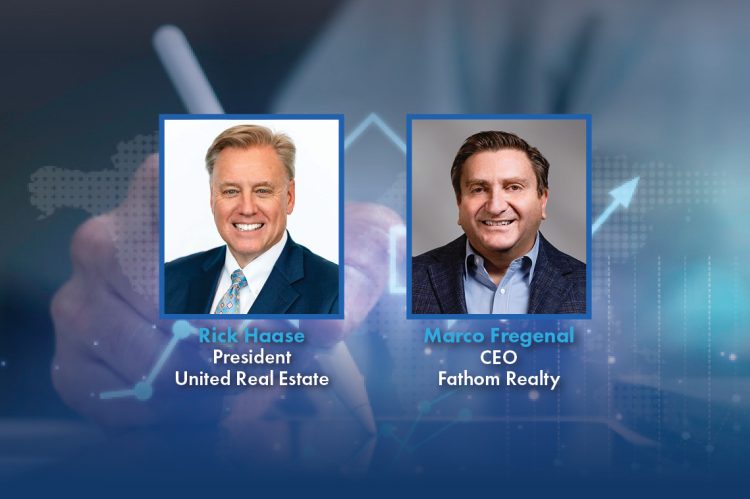Above: Rick Haase and Marco Fregenal
Despite legal changes that came about due to the Burnett v. National Association of Realtors® et al. lawsuit settlement, commissions remain central to the real estate industry, driving $1.5 trillion in annual transactions and shaping how professionals earn and brokerages attract highly productive agents, brokerages and teams. With increased pressure on commissions and shrinking margins, compensation plans and agent support are evolving quickly.
Here, two successful organizations provide a detailed look inside their agent compensation plans and how they have created a comprehensive total package to give their agents and brokers a competitive advantage and a bright financial future.
United Real Estate: Improving the financial trajectory of its brokers and agents
United Real Estate has experienced a growth spurt like no other. In just the past five years, the 14-year-old company has expanded from 6,000 agents to 22,500 agents. According to company President Rick Haase, there’s a direct correlation between that success and United’s mission.
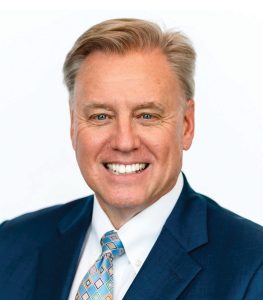
“Our mission is to improve the financial trajectory of our agents’ and brokers’ careers and lives,” he says. “They are our North Star. The key to our success is that we have brought together a rare assemblage of very talented and purpose-driven people we call Team United to be able to execute this mission.”
According to Haase, this mission isn’t something that’s just put on a plaque and hung on a wall—it’s a lens through which the company makes operational decisions, from the tools, services and business support systems it offers to creating compensation plans that flow more money to United agents/brokers than their competitors on every single transaction.
United also lives by the philosophy, “None of us are as smart or as strong as all of us,” a belief that has been central to the firm’s successful mergers/acquisitions and network affiliation strategy over the past several years.
“Each time a brokerage joins us, we become smarter and stronger. Some of the best adjustments we have made as a company have come from our agents and brokers, many of whom joined because of mergers and acquisitions or network affiliations. Yes, we have an abundance of riches to bring to their organization, but we don’t hold a monopoly on knowledge about how to run their company. We simply don’t have a mindset that we are smarter than them about running the company that they built,” Haase says, explaining that this is a very different mindset than most acquisitive real estate firms.
“It’s my experience that the first thing others do when they buy a company is change the leadership and send them on their way with a check. They strip the name of that company off the signs, websites, business cards and buildings. Agents lose their leadership, they lose their in-market identity—and then they often start messing around with agent compensation.”
Not just a paycheck, a plan for the future
In keeping with its belief of brokers and agents as its North Star, United’s big-picture strategy keeps its agents taking home as much of the gross commission as possible. At United, that happens through its transaction fee, 100%-commission model.
Under its 100%-commission umbrella, United agents pay a small fee monthly and have a single transaction fee to pay when a transaction is closed. And, although they are covered from the time they join, agents only pay errors and omissions fees when a transaction is closed. All the company’s tools, services and supports are granted to its agents under this plan with no other charges for necessary business services.
Given his storied history of operating various brokerages over the years, Haase has seen it all when it comes to compensation models and learned many valuable lessons in the process.
“Half of my leadership career has been spent running traditional companies with commission split models,” he shares. “And while they have historically been financially rewarding brokerages, those plans are now a brokerage’s greatest weakness. Our business has evolved; we discovered a long time ago that with the proper scale, we could be extremely efficient, flow more money and financial gains to agents and brokers and have plenty left over to reinvest in what they need to succeed. Our agents are highly productive. There is no nickel-and-diming our agents. United actually has more tools, more services and more support than (my previous traditional-split firm).”
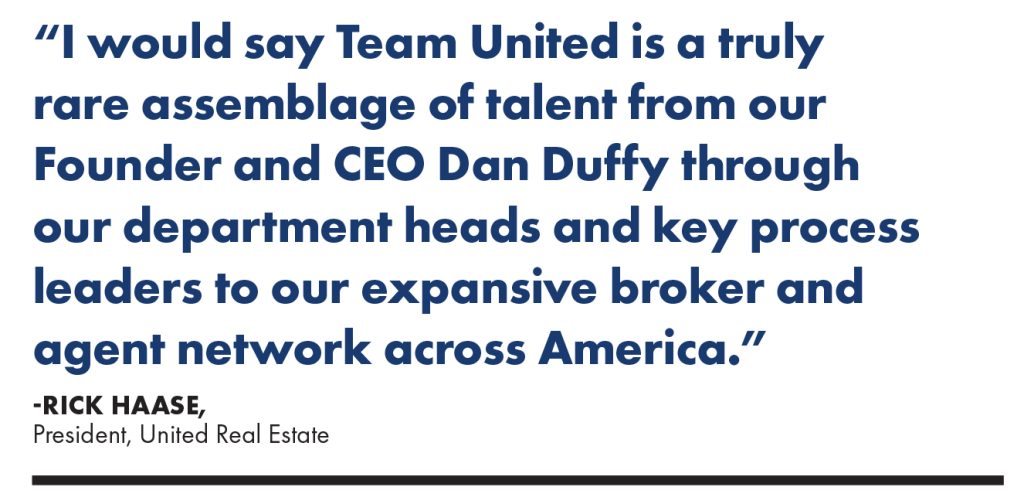 Third-party research shows that United’s compensation model is indeed working, ranking in one study as the top real estate firm when it comes to producing more gross commission income per dollar—96% to be exact—than any other brand.
Third-party research shows that United’s compensation model is indeed working, ranking in one study as the top real estate firm when it comes to producing more gross commission income per dollar—96% to be exact—than any other brand.
Haase says they are achieving their mission but also taking things a step further. They help agents improve their financial literacy so that they can grow the money they’re earning. As part of United’s holistic Financial Wellness program, the company has made a significant investment in its agents, brokers and employees by purchasing them a seat on Dave Ramsey’s SmartDollar program. This program helps participants learn to manage their money to achieve financial goals, including paying down or eliminating debt to increase savings.
“We did that because it’s not just about how much money you make, it’s about how much money you keep and how you grow your net worth,” says Haase.
United has also invested in helping agents build wealth by recently launching “URESI,” or United Residential Investment, providing agents with expert training and an engaged community so that they can repurpose their real estate skills to build long-term wealth for themselves.
Another area intertwined with long-term financial stability is healthcare, something that is hard to come by in the independent contractor community and why United offers multiple health plan options. As Haase explains, being uninsured or underinsured is the No. 1 cause of personal bankruptcy in the country. “A lot of independent contractors are moving through life without the safety net of a solid healthcare program, and we have great options for our people.”
This effort to support the long-term financial stability and success of agents helps explain United’s rapid expansion. That said, Haase understands that compensation reigns
supreme.
“How important is our compensation plan? Very, very important,” he says. “And CRMs, paid and referral-fee-free lead generation platforms, marketing and technology services, training and education and in-market principal broker support are all table stakes for a brokerage to grow today. This is a very different company relative to how much agents and brokers get paid and how rich the business toolset is to back it up. We believe we have the winning hand with our compensation plan and the total value proposition. Companies that have only one part of the equation end up with bad outcomes, especially in the current market conditions.”
Letting agents choose their own path
“Sometimes this industry makes the mistake of talking about agents like they’re all one big category of people, and they’re not,” says Haase. “A monosyllabic or unidimensional compensation model is dead. That’s why when we acquire or merge with another company, we allow their commission plans to stay the same, evolve into our core model or evolve into a hybrid and most importantly, we show them how to do just that.
“Agents need different things during the stages of their career. Heavy emphasis on core business planning for newer agents, running a large team, coping with regulatory impacts, we have it covered,” adds Haase. “When agents are in the final quartile of their career and have achieved success, they need different support than when they are new, and we understand this.”
What does that freedom look like at United? For one, agents can choose to utilize the company’s tools or use what they wish outside the company, if they prefer. Agents also have options when it comes to lead generation, choosing to pay for company-subsidized leads or use United’s LeadBoost platform to generate referral-fee-free business opportunities at the lowest cost in the market. “So, we have a really solid mix of purchased lead generation, but of equal importance, we have referral-fee-free lead generation services and systems built into the business tools that we provide,” says Haase.
A formula for sustained growth
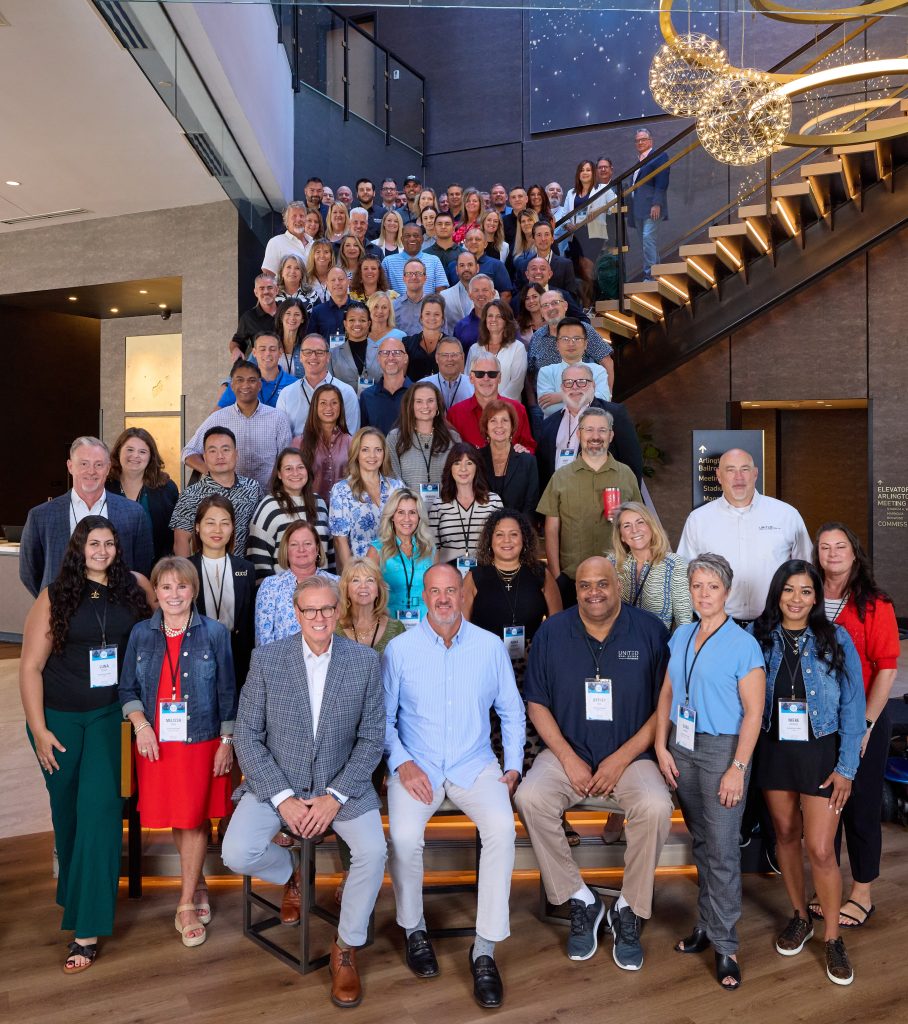
United leadership has never been ruffled by the skeptics. “People ask, ‘Are you going to be able to sustain your success?’ My answer is that we may well be double our current size in three years, and possibly sooner,” notes Haase.
United’s scale is clearly one of the company’s greatest strengths—it’s that size that allows it to pay agents the highest percentage of gross commission income and provide robust services to its brokerages.
“No franchise or independent brokerage is ever going to succeed based on how they compensate agents alone,” says Haase. “I think the way you help agents succeed in life as a whole and financially is the key. We’ve been rewarded with growth, and we measure that by agents and transactions—but our revenue growth fuels our innovation, as we reinvest in building the tools, products and services that our agents need to grow now and into the future. Scaling is not just about speed and ‘hurry up, get big.’ It’s about doing it with precision and
efficiency.
“In short, I would say that Team United is a truly rare assemblage of talent from our Founder and CEO Dan Duffy through our department heads and key process leaders to our expansive broker and agent network across America. This team creates our culture of collaboration, excellence and commitment, and is why we are being rewarded with tremendous growth when most are shrinking in size and scale.
“We are what a real estate brokerage network would be if it could start with a clean sheet of paper, and the velocity of our revenue, transaction volume and broker/agent growth is pointing to a winning combination for the entire United Real Estate
network.”
For more information, please visit https://www.GrowWithUnited.com.
Fathom Realty: Where agent choice rules
Celebrating a 23% increase in agent count in the second quarter of 2025, the predominantly virtual Fathom Realty is starting to put the challenges of the commission lawsuit in the rearview. According to CEO Marco Fregenal, Fathom’s progress during these particular times is especially impressive.

“Great companies gain market-share during difficult times,” says Fregenal. “Because it’s easy to grow your business when everybody’s doing well. The companies that continue to grow even during difficult times are the companies that are really bringing value.”
According to Fregenal, Fathom’s second quarter performance reflects the firm’s consistent effort over time. “It’s the result of many months of hard work,” he says. “It’s a byproduct of our team, our leadership and continuing to demonstrate that we offer meaningful value to our agents.”
Freedom of choice
Fathom’s value, says Fregenal, comes down to one main philosophy: giving agents choice—especially when it comes to how they are compensated.
“People think that real estate agents are all the same,” he says, “and that couldn’t be further from the truth. We want to be a partner with that agent throughout their career journey. Our three commission plans are built to meet agents exactly where they are and where they want to go in their real estate career.”
Currently, the company offers agents three different compensation plans that fall under the hybrid commission umbrella: Fathom Max, Fathom Share and Fathom Elevate. Each plan has distinct fees associated with different levels of service, along with different revenue-share programs. The plans are designed to provide agents with a menu of compensation plans to choose from that will best serve their personal revenue goals, along with how they like to do business.
Fathom Max, for example, is a fee-based program geared toward part-time agents or high-producing agents who want a hands-off approach. Fathom Share leverages Fathom Max and also includes a rev-share component, appealing to those agents who like to mentor and nurture other agents.

By incorporating revenue share into the compensation package of the Fathom Share plan, Fathom is helping to diversify how agents make money. “If you look at other companies, a very small percentage of their agents actually make any money on revenue share,” says Fregenal. “Our revenue-share program is for those agents who want to earn some incoming revenue share. They’re still paying a reasonable fee, but they have the upside of making money on their revenue share.”
Finally, the recently introduced Fathom Elevate plan is for agents looking for a concierge level of service from their brokerage.
“The real estate industry is probably one of the few industries that I know of that asks salespeople to do all this non-sales activity,” says Fregenal. “Fathom Elevate is designed to say, ‘Listen, we’re going to take care of all of this for you so you can focus on the most important thing, which is taking care of your clients.”
According to Fregenal, Fathom Elevate has a bold goal of helping agents significantly increase their business within two years. To that end, it provides lead generation, transaction coordination, marketing and branding, coaching, as well as an ISA team to follow up with leads.
“It’s a comprehensive product, and we charge an 80/20 split, which is basically what some companies are charging for doing very little for the agent,” he says.

Samantha Giuggio has had an impressive climb with the company, starting as an agent 15 years ago, just one year after Fathom was founded by Josh Harley in 2009, and now serving as COO of Fathom Holdings and president of Fathom Realty.
“Sometimes agents don’t know what the next step is,” says Giuggio. “They’re not sure how to grow their business—they need a little bit more. So this concierge piece with Fathom Elevate allows us to offer marketing, lead generation, transaction coordination and expert coaching.”
The larger intent behind Fathom’s variety of compensation plans, explains Fregenal, is to create a home where agents can thrive throughout every stage of their career. With the ability to change plans each year, agents can make decisions based on how their business is developing or how their career goals are changing. What makes this wide spectrum of choices possible is Fathom’s in-house technology called intelliAgent and the economies of scale it can provide.
“It’s really not just about, ‘Do I have the right plan, and am I at the right brokerage?’” says Giuggio. “It’s about, ‘Okay, now how do I grow? What are the next steps I should be taking advantage of based on my goals?’ I don’t think any two agents run their business the same way. Agents value different things.”
What you see Is what you get
As CEOs go, Fregenal describes himself as “a fairly humble guy.”
“Some people say, ‘Marco, you need to be more out there. You need to be more flashy.’ I think that’s silly.”
Instead, Fregenal’s true focus is on building a great company with great people. And to deliver on that goal, Fathom’s compensation plans must be completely transparent.
“This industry is plagued by a lot of big egos and a lack of transparency,” he says. “You see some companies saying they’re a 100%-commission company, and you go to their website and they say the agent keeps everything. But what about the transaction fee? They don’t even talk about it. I don’t want to be that kind of company. If you go to the Fathom website, you’re going to see all of our fees there, period.”
The diversity of compensation plans Fathom offers, along with the transparency around them—and the ability for agents to switch annually as needed—is a key component of Fathom’s agent growth and retention. And Fregenal has the data to back that up.
“We have one of the lowest turnover rates in the industry,” he says. “Nearly 90% of our agents who leave are closing one or two transactions.”
Compensation plans aside, the secret weapon behind Fathom’s loyal agent force is the company’s culture, says Fregenal.
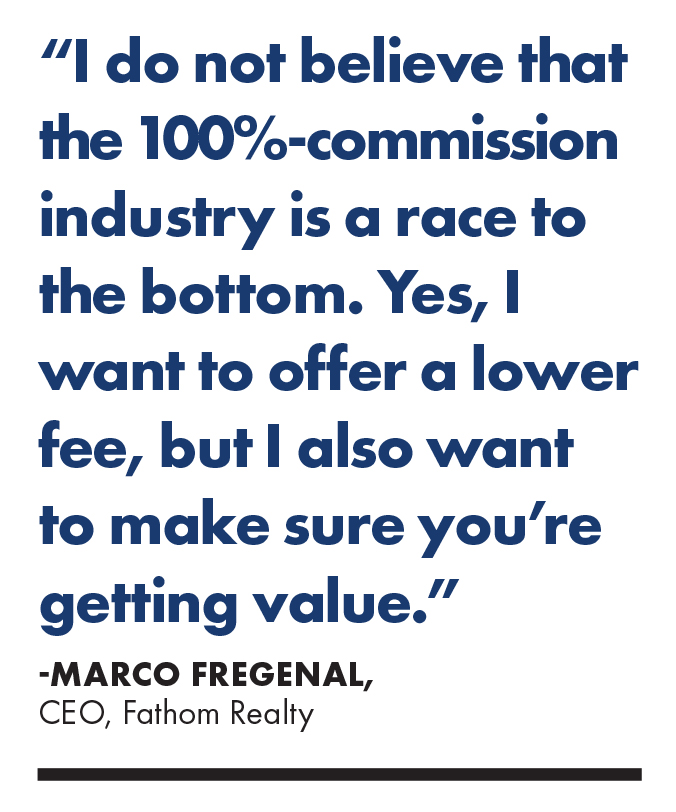 “The reason we keep growing is because we offer agents choice,” he explains. “The other element is our servant leadership culture. Long-term success depends on protecting our culture. That means we can’t compromise by retaining agents who don’t share our values, regardless of production—we’re prepared to guide those individuals toward other opportunities.”
“The reason we keep growing is because we offer agents choice,” he explains. “The other element is our servant leadership culture. Long-term success depends on protecting our culture. That means we can’t compromise by retaining agents who don’t share our values, regardless of production—we’re prepared to guide those individuals toward other opportunities.”
“Agents come to Fathom initially either because we have a unique model or the compensation model just makes a lot of sense for them,” says Giuggio. “But what keeps them here is the combination of the financial freedom and the culture we work really hard to build.”
Going beyond brand borders
Next year, Fathom will offer up part of its success formula to the industry at large, as it begins to license its technology suite, intelliAgent, to other companies.
“We can go to a small brokerage, or any size brokerage, and change the way they do business and save them a significant amount of money,” says Fregenal. “What I want to do with intelliAgent is help the smaller brokerages survive and thrive by allowing them to benefit from economies of scale and operational efficiencies that they will never be able to reach on their own.”
Fregenal believes that this beyond-brand strategy, along with the continued evolution of its compensation plans, such as Fathom Elevate, will help secure Fathom’s growth in a changing industry.
“I think this industry for so many years has had all these big companies that didn’t really rock the boat,” he says. “And now you’ve got all these younger companies coming in with different models—I think that the next 10 years are going to be very telling in this industry.”
With that in mind, Fregenal remains committed to continuous improvement. “Everyone who works with me knows that when things are going really well, I start looking for what we can improve,” he says. “Sometimes that means rethinking or reshaping something that’s already working—because that’s how we grow and get better.’”
This philosophy of always doing more for agents, and doing it better, will continue to differentiate Fathom in the marketplace, Fregenal believes.
“If we become more effective and efficient, and reduce our expenses, that means we can offer more,” he says. “I do not believe that the 100%-commission industry is a race to the bottom. Yes, I want to offer a lower fee, but I also want to make sure you’re getting value. I think you’ve got to find the right equilibrium so that you’re still offering value.”
“The market today is probably more challenging than it’s ever been for a lot of reasons,” says Giuggio. “Our plans empower agents to keep more of their money and handle things the way they want to.
“Fathom was built on the belief that agents deserve more, and not just in terms of commission, but that culture, that opportunity, that support. And I think our growth is proof that when you empower agents, they empower their clients and everybody wins.”
For more information, please visit https://www.fathomrealty.com.



